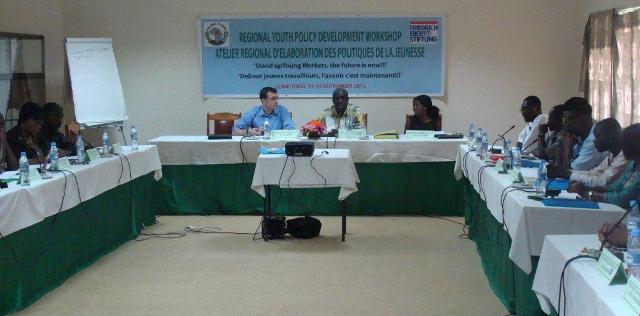
"Stand up young workers, the future is now", is the theme of the regional workshop organized by the ITUC-Africa in partnership with the Friedrich Ebert Stiftung Organisation in Lomé from 12 to 14 September 2012.
20 Union leaders and focal points of young workers from several African countries took part in this workshop for the development of youth policies.
In her welcoming address, the ITUC-Africa Youth Program Coordinator, Comrade Rhoda BOATENG strongly wished that this workshop is interactive and yields concrete proposals to develop strategies of policies for young workers at the national and regional levels.
The general Secretary of ITUC-Africa, Comrade Kwasi ADU-AMANKWAH who opened this meeting pointed out the problem of the low participation of young workers in the unions. He focused on the role of the youth and the importance of their empowerment in unions.
Comrade Amankwah also raised the need for strengthening the capacity of workers so that the young ones are given the place they deserve.
He insisted on the fact that any change affecting the youth will not be successful without the involvement of the young workers themselves. "Nothing for us without us", he said to that effect.
The representative of FES, Mr. Constantin GRUND who subsequently took the floor said that the concerns of trade unions youth are in line with those of his organization. He also raised the problem of fragmentation of unions which does not attract young workers to unionism.
Several communications followed.
The first was an analysis of the major challenges faced by young people. This presentation put emphasis on the responsibility of young workers, jobs related issues and unemployment. It generated a rich debate which focused on the issue of job creation in Africa, the growing inequalities in the distribution of wealth. The issue of entrepreneurship training was also raised.
The second communication that was on policies of youth in trade unions at the continental and regional levels mainly focused on the results of the research on the educational system in Africa. It appears that the low level of education in Africa is the root of most of the problems the continent is facing. The ensuing discussions focused on the need for trade unions to influence the political content in national education.
The third presentation was an overview of national policies for young people at Union and global levels. The difference between a charter and a policy was stricken out.
This communication raised the issue of implementation of policies and the fact that these policies do not often reflect the realities of our continent. A panel discussion was organized where participants shared experiences of some institutions and African regions, namely, NEPAD, SADEC, ECOWAS, East and central Africa. The resulting initiatives were implemented in order to strengthen activities in favour of young workers. Other issues like those related to HIV-AIDS, good governance, change of attitude and the need for trade unions to carry out actions for the integration of young workers were also discussed.
The works of this first day were thus closed in a climate of general satisfaction.
